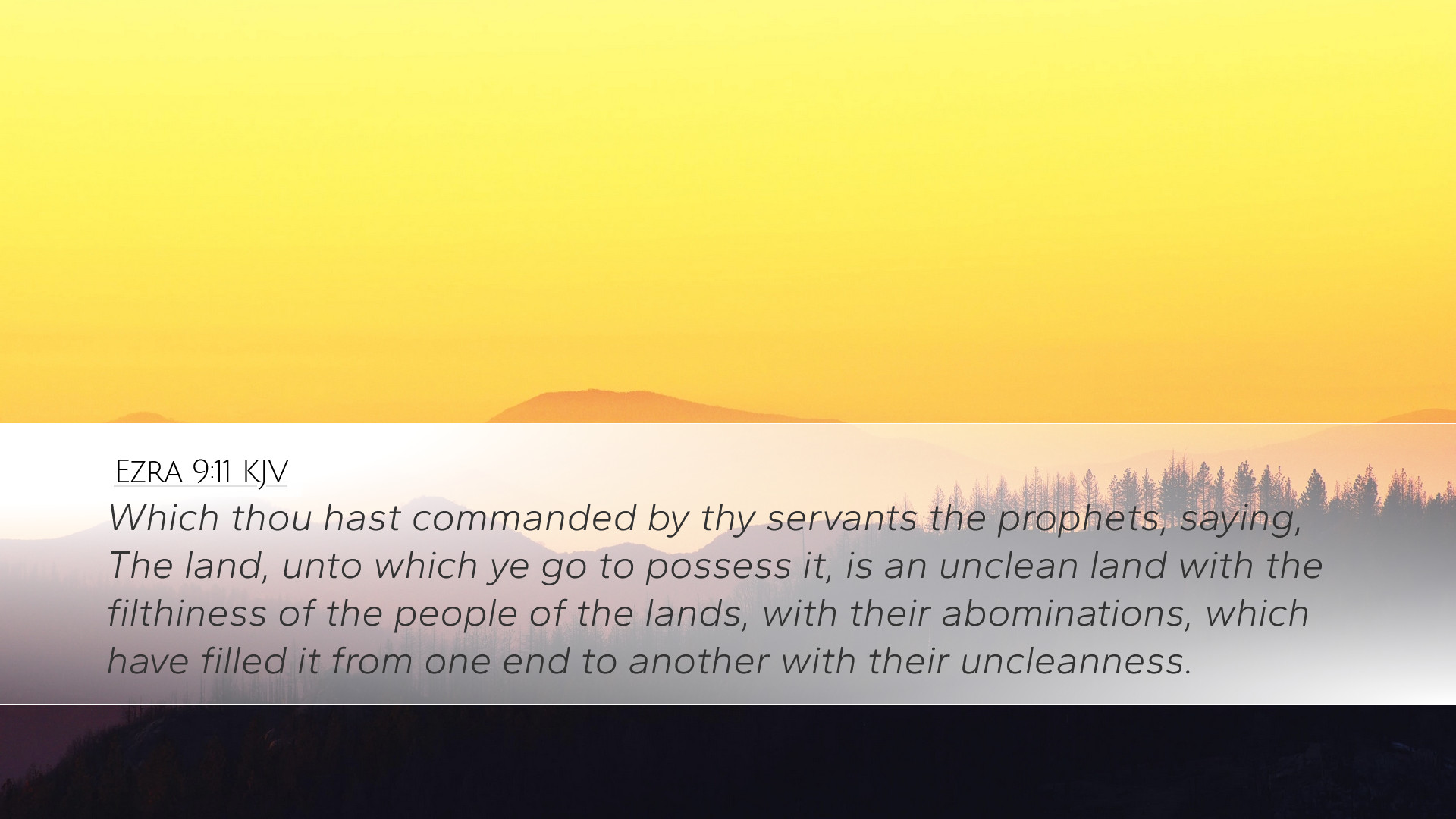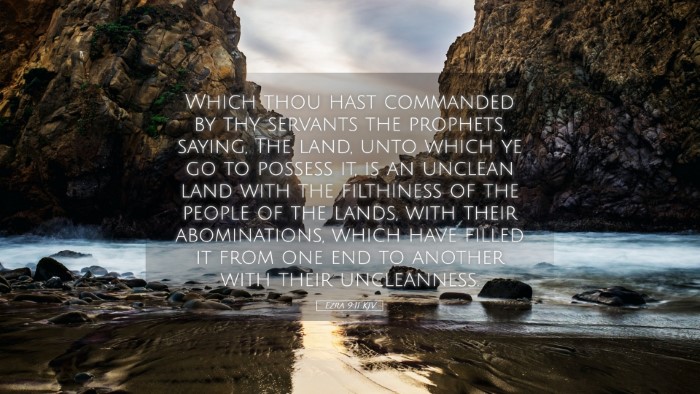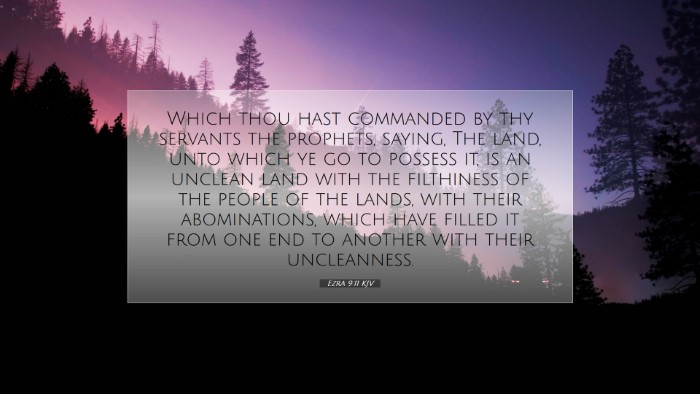Old Testament
Genesis Exodus Leviticus Numbers Deuteronomy Joshua Judges Ruth 1 Samuel 2 Samuel 1 Kings 2 Kings 1 Chronicles 2 Chronicles Ezra Nehemiah Esther Job Psalms Proverbs Ecclesiastes Song of Solomon Isaiah Jeremiah Lamentations Ezekiel Daniel Hosea Joel Amos Obadiah Jonah Micah Nahum Habakkuk Zephaniah Haggai Zechariah MalachiEzra 9:11
Ezra 9:11 KJV
Which thou hast commanded by thy servants the prophets, saying, The land, unto which ye go to possess it, is an unclean land with the filthiness of the people of the lands, with their abominations, which have filled it from one end to another with their uncleanness.
Ezra 9:11 Bible Commentary
Commentary on Ezra 9:11
Ezra 9:11 states: "Which thou hast commanded by thy servants the prophets, saying, The land, unto which ye go to possess it, is an unclean land, with the filthiness of the people of the lands, with their abominations, which have filled it from one end to another with their uncleanness."
Context and Background
The historical context of Ezra 9:11 is pivotal for understanding the gravity of the situation that Ezra and the exiled community faced. After returning from Babylonian captivity, the Israelites were tasked with rebuilding the Temple of Jerusalem and re-establishing their covenantal relationship with God. The influx of foreign peoples and practices posed a severe threat to their spiritual purity.
Interpretation and Analysis
Ezra 9:11 contains profound implications regarding the holiness of the land of Israel and the moral consequences of intermingling with foreign nations. Each of the public domain commentaries provides unique insights into this critical verse.
Matthew Henry’s Commentary
Matthew Henry emphasizes the warning provided through the prophets concerning the defilement that accompanies the pagan practices of neighboring nations. He notes that God’s command was clear: the land belonged to Him and was to be kept pure and undefiled. Henry underscores that the "filthiness of the people" is not merely physical but also spiritual corruption, which can lead to divine judgment.
- Holiness of the Land: Henry posits that the land is to be viewed as holy, charged with the presence of God. He notes that any introduction of idolatry and heathen practices would pollute this sacred space.
- Consequences of Defilement: The author asserts that engaging with these abominations results in grave consequences, where God’s displeasure can manifest in various forms such as exile, famine, or other calamities.
Albert Barnes’ Commentary
Albert Barnes explores the specific mention of the "abominations," highlighting that these practices could not coexist with Israel's covenant with God. He reminds readers of the importance of maintaining spiritual separation from non-believing nations.
- Call to Separation: Barnes insists that God’s directives were not arbitrary but governed by a desire to protect His people from moral degradation. He notes that the presence of these abominations would draw the hearts of the Israelites away from sincere worship.
- Spiritual Implications: He also addresses the broader spiritual implications of this warning, teaching that Israel's historical pattern of compromise led to severe repercussions, ultimately a neglect of foundational covenant truths.
Adam Clarke’s Commentary
Adam Clarke adds depth to the understanding of Ezra 9:11 by detailing the nature of the “uncleanness” referred to in the verse. He explains that the moral and ethical challenges posed by the surrounding nations manifested through their worship practices and societal norms.
- Nature of Uncleanliness: Clarke interprets the term “unclean” to encompass a range of behaviors, including idolatry, immorality, and social injustices, all conditions to be avoided by the Israelites.
- Prophetic Warning: He reiterates the prophetic nature of the warning as a means to safeguard the community. Clarke notes that these warnings served as a necessary prelude to the community's actions and choices.
Application for Today's Church
For modern-day believers, Ezra 9:11 serves as a reminder of the importance of maintaining a holy witness. The pulling forces of secularism and syncretism threaten to dilute the purity of church doctrine and community life.
- Commitment to Holiness: Pastors are called to safeguard the purity of their congregations, echoing the sentiments of Ezra by encouraging a lifestyle that is distinct and holy.
- Importance of Discernment: The verse highlights the necessity of discernment regarding cultural influences and the need for the church to stand firm against practices that clash with biblical mandates.
- Taking Responsibility: As spiritual leaders, there is an obligation to guide believers in understanding the ramifications of their choices, much like Ezra did for his people.
Conclusion
Ezra 9:11 is more than a historical remark; it reflects a critical spiritual insight that transcends time. The insights drawn from the commentaries of Henry, Barnes, and Clarke collectively elevate the understanding of God’s call for holiness and the preservation of purity within His church. As such, the verse remains a beacon for pastors, students, theologians, and scholars alike, urging deliberate commitment to divine principles amidst a world that continuously challenges them.


